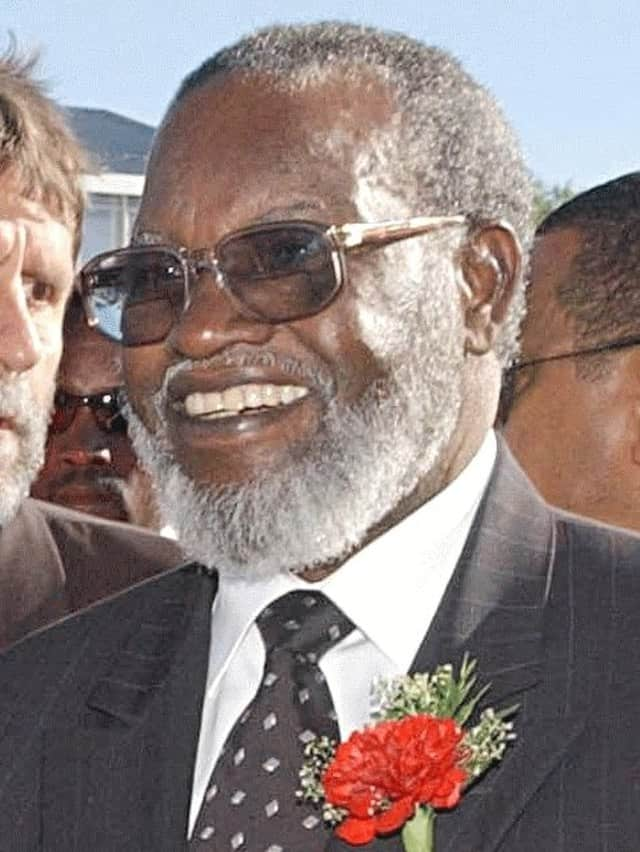Namibia’s first democratically elected president, Sam Nujoma, died in Windhoek, Namibia on February 8, 2025. Before his death, he had been hospitalized for three weeks for an undisclosed illness. The country is going through a period of national mourning as they prepare for Nujoma’s final journey. But who was Sam Nujoma? Keep reading to learn about his influence on Namibia’s political landscape.
Early Childhood

Sam Nujoma, whose full name is Samuel Shafiishuna Daniel Nujoma, was born on 12 May 1929, in Etunda, a village in Ongandjera, near the town of Okahao, Ovamboland, Southwest Africa. He was the oldest of 11 children and spent his childhood looking after his siblings and tending to the family cattle.
Become an insider. Subscribe to our newsletter for more top trending stories like this!
Regarding his education, Nujoma attended the Finnish Missionary and attained the highest level of education for black people at the time, at the age of 10. By the time Nujoma was 16, he began working at a general store for a monthly salary of 10 shillings and later at a whaling station.
He later moved to South African Railways (SAR) where he worked as a cleaner. At the same time, Nujoma attended St Barnabas Anglican Church School to improve his English and further attended the Trans‐Africa Correspondence College in South Africa.
People Also Read: What Factors Determine Whether People Turnout to Vote in U.S. Elections?
Political Career
Sam Nujoma got into politics in the 1950s. His experience in the labour system, knowledge of campaigns in Africa, and work experience, shaped his political views. Due to his involvement, the SAR dismissed him.
Seven years later, Nujoma joined the Ovamboland People’s Congress (OPC), formed by his friend, Andimba Toivo ya Toivo, and later changed its name to Ovamboland People’s Organization (OPO). At its first congress, Nujoma was elected the president of the party. He then secretly set up branches across the country to expand its reach.
At this time, an anti-colonialist party, the South West African National Union (SWANU), which Nujoma joined as OPO’s representative.
Join our Spotcovery Global Black Community Facebook Group for early access to exclusive content and to share in a lively discussion.
African Biographics
Going into Exile
Due to his party’s involvement in organizing an anti-colonial narrative, Nujoma faced threats of arrest and deportation from the country. Consequently, he petitioned the United Nations to help him flee into exile and eventually, on February 29, 1960, he left Namibia.
Nujoma lived in several countries during his time in exile, including Tanzania, Zambia, Angola, Algeria, Libya, the Soviet Union, and Cuba.
People Also Read: Breastfeeding Awareness Month 2024: Theme, Dates & Everything You Need Know
Formation of SWAPO
Nujoma’s party, OPO, broke away from SWANU and formed the South West Africa People’s Organisation (SWAPO) in 1960, in New York. He was elected its president in absentia. From there, Nujoma and other colleagues expanded the party’s reach across the world.
During this time, Namibia’s War on Independence broke out. When the Portuguese Empire collapsed, Nujoma drove his forces in and assured them to build a country that served the Namibians regardless of their race, religion, and power.
He was then at the forefront of independence negotiations between SWAPO and other countries like the U.S., Britain, France, West Germany, and South Africa. In 1978, they arrived at a proposal, named the United Nations Security Council Resolution 435, which would lead to free and fair elections in the country, it wasn’t implemented until 1989.
Become an insider. Subscribe to our newsletter for more top trending stories like this!
People Also Read: Make National Garden Month Memorable by Planting These 10 Plants in Your Backyard
Return from Exile and Presidency
After 29 years in exile, Nujoma returned home in September 1989 and was elected Namibia’s first president. He was sworn into the presidency in March 1990. By this time, Namibia was heavily divided due to colonialism, something Nujoma worked on immediately.
He announced the national reconciliation through which the country worked on easing relations between the different ethnic groups. Another declaration he made concerned land reforms through which land was redistributed to black people.
Nujoma won the next two elections, in 1994 and 1999, winning with 76.3% and 76.8%. In 2004, he handed over power to Hifikepunye Pohamba.
People Also Read: National Walking day: Why Walking Can Help You Take Control of Your Health
Post Presidency and Legacy
After leaving his presidential position, Sam Nujoma remained active, and campaigned for his party, SWAPO, at campaigns and rallies. In 2015, the government granted him an official resident.
Sam Nujoma left behind a legacy as the “Founding Father of the Namibian Nation”, a title conferred by an act of parliament in 2005. After his death, the National Assembly said his contributions were foundational to creating a constitutional democracy.
Conclusion
Sam Nujoma’s passing marks the end of an era for Namibia and Africa’s liberation movements. As the country’s first democratically elected president and a key figure in the struggle for independence, his legacy is deeply woven into Namibia’s history. While his leadership was not without controversy, his role in shaping the nation is undeniable. As Namibia observes a period of mourning, his contributions to the country’s sovereignty and development remain a lasting testament to his influence.
Nearly 80% of consumers visit directories with reviews to find a local business. List your business for free in our exclusive Spotcovery Black-Owned Business Directory.
Spotcovery offers unique and fresh daily content on Black culture, lifestyle, and experiences. We talk about everything black, black people, black-owned and black-owned businesses. We also deliver authentic and relevant content that will inform, inspire, and empower you! The future of black media is critical to today’s black experience! Our primary audience includes African Americans, Africans, Afro-Caribbean, and people of African heritage. Black culture is for the culture!
Become an insider. Subscribe to our newsletter for more top trending stories like this!





